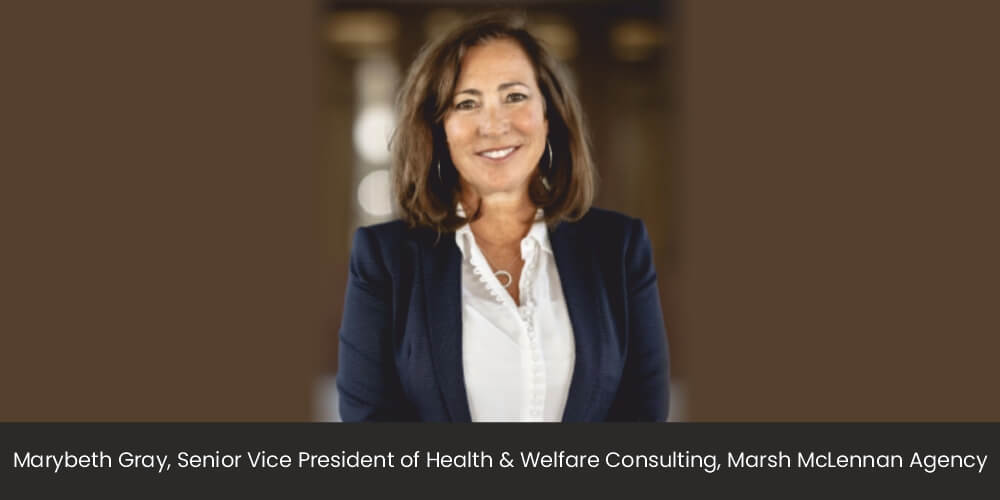Marybeth Gray, Senior Vice President of Health & Welfare Consulting at Trion, a Marsh & McLennan Agency, has dedicated over 25 years to the employee benefits field. As a staunch advocate for making healthcare accessible and affordable for every employee, she has consistently succeeded in reducing costs for both employers and their employees with her team. In her current role, Marybeth oversees overall account management for her clients, leveraging her strategic approach and extensive industry knowledge to deliver remarkable savings and enhanced healthcare quality.
Marybeth’s clients benefit from her unwavering availability and the support of a dedicated team of experts who manage their healthcare programs. Together, they have saved clients millions of dollars by not only dissecting current actions but also by helping employers anticipate future developments. Marybeth excels in analyzing healthcare costs and benefit plans, identifying financial opportunities, and aiding in strategic planning, particularly for large, self-insured clients. Her ability to navigate the complexities of employee benefits and healthcare has made her a trusted advisor, known for her skill in developing strategies that yield substantial cost savings while improving the quality of care for employees.
Below are highlights of the interview:
What inspired you to transition from working on the insurer side to becoming a consultant and advocate for employers in the healthcare industry?
I saw opportunities to improve healthcare and wanted to create strategies to lower costs for employees and their families. I was unable to influence many of these strategies on the carrier side. When my team works through utilization reports from the carriers, it is apparent what health conditions are driving costs, and we are skilled at designing programs to influence, not only the price but raising the quality. According to the CDC, 90% of the nation’s $4.5 trillion in healthcare spending annually is attributable to Americans with chronic conditions. Managing these through targeted strategies will raise the quality of care and lower the cost for both employers and members.
Can you describe your role as Senior Vice President of Health & Welfare Consulting at Marsh McLennan Agency?
I work with a team of the best professionals in the business here at Marsh & McLennan Agency. We surround our employer partners with a five-person team to help them:
Understand the utilization patterns within their populations and develop a three-year strategy to address the cost drivers by raising the quality of care, thus positively influencing the cost and outcomes.
What are your main responsibilities and objectives?
My personal home on the team of five is as a strategist. I love data—the more the better—to understand what we need to solve for. Our current healthcare system is complicated and anything but user-friendly. Together, we need to change that on behalf of the employees and their families. Together with employers, we need to be there when our members need us the most—when they are not well and need help getting the right care—the first time.
What are the biggest challenges you face in your role, and how do you overcome them to deliver value to your clients?
The largest challenge we have is the complicated healthcare systems and the lack of information on the quality of providers. The navigation path for members is also not well defined today. The affordability of medications is also a big challenge to both employers and their members. Congress is trying to understand and “unwind” the cost of pharmaceuticals and payment schemes being used in the industry. I had the opportunity to listen to Mark Cuban and his views on the pharmacy industry, and he is doing his best to shine light on the overcharges being born by the employers. We too are negotiating on behalf of employers to ensure they are not overpaying and there are important clinical programs in place to raise the quality for members. We have developed a tool for employers to aggregate and leverage purchases in this area, helping employers to save millions of dollars annually.
What strategies do you employ to develop cost-effective healthcare plans that benefit both employers and their sickest employees?
Each client is different, with different populations and health cost drivers. We design individual programs for each employer and implement the changes over a period of time to reduce employee impact, which is chipping away at reducing costs. An example of this is cancer. It is the number one cost driver for employers in the US in 2024. 1.7 million people are diagnosed with cancer annually in the US, and over 600,000 die every year. Costs (mostly born by the employers in the US) for cancer in the US are projected to cost $240 billion by 2030, according to the CDC. Where you get cancer treatment matters. There are new, very effective treatments being developed daily. Immunotherapy developed by Jim Allison, head of oncology at MD Anderson, has been shown to be effective at treating the deadliest cancers with success. Employers are developing a “Cancer Centers of Excellence” strategy to help guide and direct members with this scary diagnosis to hospitals and providers who have a special expertise or higher quality for certain types of treatment. It drives lower costs and better outcomes for members.
How have you seen the healthcare industry evolve over your career, and what trends do you think will shape the future of employer-sponsored healthcare?
We will see more change in healthcare in the next 5 years than we have in the past 50 years. When the Human Genome Project, an international research project to decode the human genome, ended in 2003, we finally had a map. US scientists partnered with scientists around the world to further understand how our genetic makeup affects our health. What they found over that next decade was fascinating. We now see that many diseases that we have lived with for generations are mutations in the letter of our genome.
When I speak with employers, we talk about how we can use these new medical breakthroughs to enhance our benefits and move forward in raising the quality to lower the cost. We need to change the “slow to adopt” strategies and use the new medical breakthroughs to help our members to better care, and the only entities that have the ability to do that are the employers in the US.
How do you balance the interests of employers with the needs of employees to ensure that healthcare plans are both affordable and comprehensive?
Raise the quality, and you will lower your costs. There are fantastic new developments and medical breakthroughs we can grab a hold of and incorporate into our benefits programs to move to programs that will prevent diseases rather than treat them. Employers are the key to success here; we need to design healthcare programs to help members navigate to the best provider the first time. Pharmacogenomics, for example, will enable us to have members on the right drug, at the right dose—the first time. Better care is less expensive.
How has your educational background and previous experience on the insurer side influenced your approach to healthcare consulting?
I graduated from The Pennsylvania State University with a B.S. degree in Health Policy and Administration. I do go back annually for the “alumni day in the classroom” to share and talk with the future leaders in healthcare. We will see more change in healthcare in the next 5 years, than we have in the past fifty, and it is an exciting time to be in this field. Together, we can make a difference.
How do you work with organizations to understand their unique needs and tailor healthcare solutions that meet those needs?
Each client is different when building healthcare benefits programs… There is no “right answer.” It is a philosophical approach and different for each client. Understanding the employer’s culture and what healthcare benefits mean to each is the key to designing programs that fit that company and their employees. Healthcare for most employers is the second highest business expense after payroll. It is critical to recruiting and retaining the talent that runs the business. With the younger population in the workforce looking for empathy from their employer as a key desire, what better place than the healthcare benefits program to incorporate that into the offerings.
What are your future goals for your role at Marsh McLennan Agency, and how do you plan to continue making an impact in the healthcare consulting industry?
I have some initiatives I am working on to help other women in business. I want to promote women in our industry as well as others. More to come on this!
What advice would you give to someone looking to pursue a career in healthcare consulting?
I volunteer to teach a class at my alma mater—The Pennsylvania State University, College of Health Policy and Administration every semester, and it is so fantastic to see the students that are just beginning their careers in our industry. It is such a fascinating time in healthcare as scientists are curing and solving diseases we have lived with as Americans for generations. We have significant challenges facing us in the costs of healthcare and fair and equitable access for all. Our younger generations in the workforce will have to be creative “change agents” and be willing to try new solutions to help us solve these challenges.
Please visit: https://www.marshmma.com/





